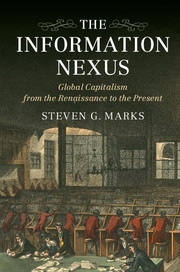Book contents
- Frontmatter
- Dedication
- Contents
- Preface
- Acknowledgments
- Part I “Capitalism,” word and concept
- Part II The information nexus
- 4 Early modern Europe's expanding field of vision: The origins of capitalism
- 5 The age of electricity and engines: America's mass market
- 6 The digital age and the globalization of capitalism
- Conclusion
- Index
4 - Early modern Europe's expanding field of vision: The origins of capitalism
from Part II - The information nexus
Published online by Cambridge University Press: 05 July 2016
- Frontmatter
- Dedication
- Contents
- Preface
- Acknowledgments
- Part I “Capitalism,” word and concept
- Part II The information nexus
- 4 Early modern Europe's expanding field of vision: The origins of capitalism
- 5 The age of electricity and engines: America's mass market
- 6 The digital age and the globalization of capitalism
- Conclusion
- Index
Summary
In 1870, workmen in a house in Prato, Italy, near Florence, knocked down a wall and came upon an old boarded-up stairwell filled with sacks of documents. It turned out they belonged to Francesco di Marco Datini, the head of a late-fourteenth-century import-export firm, and included more than 150,000 letters, 500 account books, 400 insurance policies, 300 deeds of partnership, and tens of thousands of commercial bills and instruments. This was the discovery of a medieval “database” compiled by a businessman who spent so much time sending and receiving letters that one can imagine him adjusting very quickly to email had it been introduced in the 1300s.
It is important to understand that Datini was not all that unusual for his time and place. Nor would he be out of place in today's world – although he might store his documents in a file cabinet or online rather than in sacks. If his obsession with collecting and communicating information seems familiar from the behavior of corporations in the twenty-first century, that is because Renaissance Italy's merchants had the same need to find out news that might affect their business and the same need to achieve coordination and control of their operations.
Why the similarity? Because business, whether ancient, medieval, or modern, needs information to function. The most basic feature of a market economy is a price, which is a “mechanism for communicating information” about any product being bought or sold. Besides supply and demand, what economists call “transaction costs” influence prices. The cost of doing business is obviously less, for instance, if property rights are protected, contracts are enforced, and transportation is more advanced, as these make it easier to buy, sell, and produce. Conversely, the costs are higher if these conditions do not exist. The lower such transaction costs, the more efficient the market.
Acquiring information about something one might buy, sell, or invest in is another transaction cost with an impact on market efficiency. Following the lead of economists dating back to the eighteenth century, Friedrich A. Hayek emphasized that relationship in his writings of the 1930s and 1940s: “The economic problem of society,” he wrote, “is a problem of the utilization of knowledge not given to anyone in its totality.” Several decades later, George Stigler won a Nobel Prize for coming to grips with the implications of Hayek's statement.
- Type
- Chapter
- Information
- The Information NexusGlobal Capitalism from the Renaissance to the Present, pp. 75 - 124Publisher: Cambridge University PressPrint publication year: 2016

